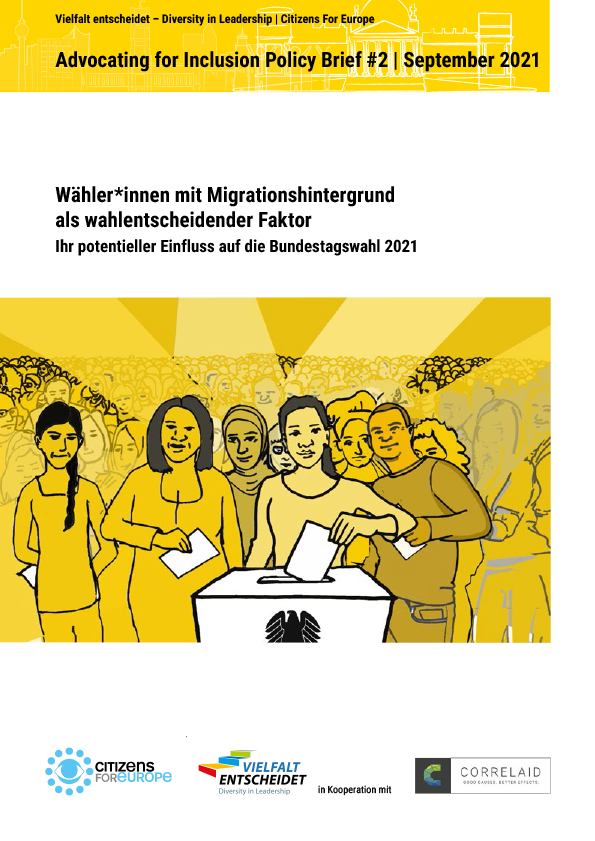People with a migration background can decide the election.

People with a migration background can decide the election.
For the first time, research-backed estimates are now available.
About 7.6 million people with a migration background are eligible to vote in the Bundestag elections - that is 12.2% of all eligible voters. In which constituencies do eligible voters with a migration background also have the potential to decide the Bundestag election? For the first time, a study by Citizens For Europe provides research-backed estimates.
"The low representation in the Bundestag is both an expression of the lack of promotion of young people in the parties and the lack of prioritisation of immigration society issues," says Daniel Gyamerah, Head of Division "Advocating For Inclusion" at Citizens For Europe.
Highlights of the study:
- Current power potential: In 167 out of 299 constituencies (56 percent), eligible voters with a migration background could decide the direct mandate for the Bundestag with their first vote. In these constituencies, the number of eligible voters with a migration background exceeds the difference in votes between the first and second-placed direct candidate in the last Bundestag election.
- Representation deficit: The proportion of eligible voters with a migration background is 12.2 per cent, which corresponds to at least 74 Bundestag mandates. At present, however, only 58 members of the Bundestag have a migration background.
- Future representation requirement: 24.2 per cent of the population have a migration background. Therefore, the number of Bundestag mandates that can theoretically be expected in the future to represent this group is at least 142 mandates.
- Voting rights for all: On average, six out of ten people with a migration background are not eligible to vote, as voting rights at federal and state level are still linked to German citizenship. In cities, this affects up to one third of the population.
- Diversity wins elections: For political parties, people with a migration background represent a considerable electoral potential if they adapt their personnel and their programmatic orientation for the increasingly diverse electorate.
Based on the microcensus and data from the Federal Election Commissioner, Jun.-Prof. Arndt Leininger, PhD (Chemnitz University of Technology), Julius Lagodny (Cornell University), Daniel Gyamerah and Deniz Yıldırım-Caliman (both Citizens For Europe), with the support of Correlaid e.V., have for the first time estimated the number of eligible voters with a migration background for all 299 Bundestag constituencies.
Our partners at CorrelAid have written a blogpost showcasing results from CorrelAid’s #tidytuesday inspired challenge to explore different ways to visualize the potential electoral power of people with so-called migration background in Germany. Check their data vizualisation: https://correlaid.org/blog/potential-political-power/
Prof. Dr. Corinna Kröber, Junior Professor of Comparative Politics at the University of Greifswald, has merged our data with survey data on the 2017 Bundestag elections to analyze how the size of the group of eligible voters with a migration background affects their voting behavior. She published her analysis in an article on the blog Counting Counts: https://countingcountsblog.wordpress.com/2021/09/23/becoming-what-you-see-how-the-voting-behavior-of-citizens-of-immigrant-origin-is-shaped-by-their-district/
Anteil Personen mit Migrationshintergrund
Prozentualer Anteil der Personen mit einem Migrationshintergrund gemessen an der Gesamtbevölkerung der Bundesrepublik.
Anteil wahlberechtigter Personen mit Migrationshintergrund
Prozentualer Anteil der wahlberechtigten Personen mit einem Migrationshintergrund gemessen an der Gesamtzahl der wahlberechtigten Bevölkerung.
Machtpotenzial wahlberechtigter Personen mit Migrationshintergrund
Machtpotenzial beschreibt die Differenz zwischen der Anzahl der wahlberechtigten Personen mit einem Migrationshintergrund und der Differenz der absoluten Stimmenzahlen zwischen der erst- und zweitplatzierten Partei. Übersteigt die Gesamtzahl der wahlberechtigten Personen mit einem Migrationshintergrund die Differenz der Erststimmen zwischen den erst- und zweitplatzierten Parteien, so birgt diese Wählergruppe ein positives Machtpotenzial und kann somit einen erheblichen Einfluss über den Wahlausgang ausüben. Zweitplatzierte Parteien hätten somit die Möglichkeit, die Wahl für sich zu entscheiden. Betrachtet wurden die Stimmen der letzten Bundestagswahl 2017.
Anteil nicht-wahlberechtigter Personen mit Migrationshintergrund
Prozentualer Anteil der nicht-wahlberechtigten Personen mit einem Migrationshintergrund gemessen an der Gesamtzahl der Menschen mit einem Migrationshintergrund.



